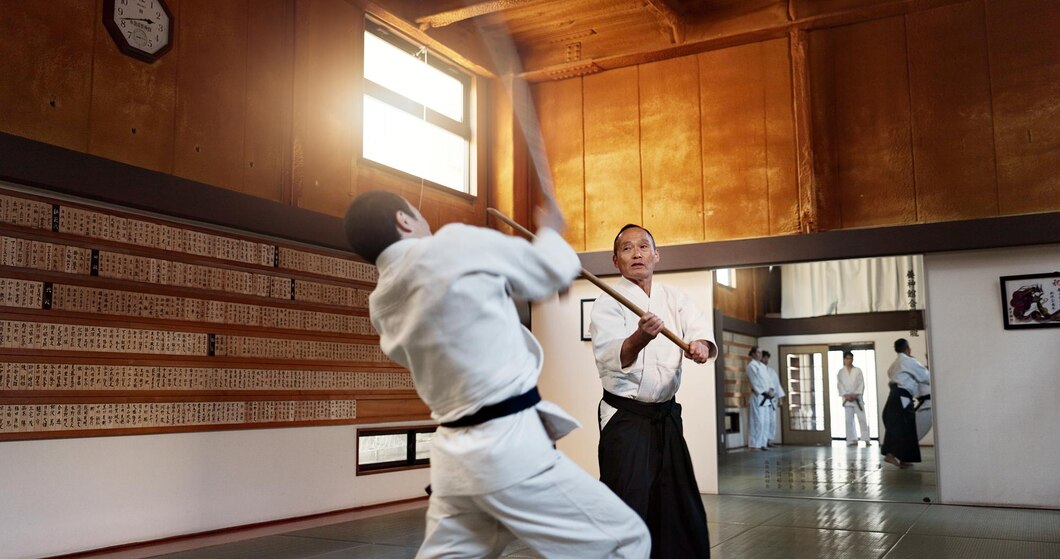In today’s fast-paced world, finding a balance between physical health, mental well-being, and community connections can be challenging. Enter Aikido—a dynamic martial art that not only hones your physical abilities but also nurtures your mind and spirit. Let’s explore the many dimensions of Aikido and how it can enrich your life.
Introduction to Aikido: A Brief History and Philosophy
Aikido, a Japanese martial art, was developed in the early 20th century by Morihei Ueshiba. Often referred to as “O-Sensei” (Great Teacher), Ueshiba envisioned Aikido as a way to harmonize with an opponent rather than confront them head-on.
The philosophy of Aikido is deeply rooted in the principles of peace and harmony. Unlike other martial arts focused on defeating opponents, Aikido emphasizes blending with an opponent’s movements to neutralize aggression. This non-violent approach makes Aikido unique and accessible to people of all ages and fitness levels.
Aikido’s techniques are derived from traditional Japanese martial arts, but its emphasis on fluidity and balance sets it apart. Practitioners learn to use an opponent’s energy against them, resulting in graceful yet effective movements.
Health and Fitness Benefits of Practicing Aikido
Practicing Aikido offers numerous health benefits, promoting both physical and mental well-being. First and foremost, it provides a full-body workout. The various techniques and movements engage multiple muscle groups, improving strength, flexibility, and coordination.
Aikido also enhances cardiovascular fitness. Regular practice involves continuous motion, which helps improve heart health and endurance. This aerobic aspect of Aikido can be particularly beneficial for individuals looking to enhance their overall fitness levels.
Additionally, Aikido promotes better posture and body awareness. Practitioners learn to move with precision and balance, which can help reduce the risk of injuries in daily life. This focus on proper body mechanics also contributes to long-term musculoskeletal health.
Aikido Techniques and How to Get Started
Getting started with Aikido is easier than you might think. Beginners are often introduced to basic techniques that form the foundation of the practice. These include joint locks, pins, and throws, all designed to control an opponent without causing harm.
To begin your Aikido journey, find a local dojo (training hall) that offers beginner classes. Most dojos provide introductory sessions where newcomers can learn the basics in a supportive environment. It’s important to wear comfortable clothing and bring an open mind to your first class.
Consistency is key in Aikido. Regular practice helps build muscle memory and improves your understanding of techniques. Many dojos recommend attending classes at least twice a week to see significant progress.
Aikido’s Impact on Mental Well-being and Stress Management
One of the most profound benefits of Aikido is its impact on mental well-being. The practice encourages mindfulness and presence, helping practitioners stay focused and centered. This mindfulness aspect can be particularly effective in managing stress and anxiety.
The repetitive nature of Aikido techniques provides a meditative experience. Practitioners often find that the rhythmic movements and controlled breathing help calm the mind. Over time, this practice can lead to improved emotional resilience and mental clarity.
Aikido also fosters a sense of inner peace. The philosophy of harmony and non-aggression extends beyond the dojo, influencing how practitioners interact with the world. This holistic approach to conflict resolution can significantly enhance overall mental well-being.
Community and Social Aspects of Aikido
Aikido is not just a solo endeavor; it’s a community-driven practice. Joining a dojo means becoming part of a supportive network of practitioners who share a common interest in self-improvement and harmony.
Training with others encourages camaraderie and mutual respect. Aikidokas (Aikido practitioners) work together to refine techniques, offering constructive feedback and support. This collaborative environment fosters strong social bonds and a sense of belonging.
Many dojos also organize social events, seminars, and workshops. These gatherings provide opportunities to deepen your understanding of Aikido and connect with practitioners from different backgrounds. The sense of community in Aikido extends beyond the mat, enriching your social life.


Aikido’s inclusive nature makes it suitable for individuals of all ages and fitness levels. Whether you’re a child, an adult, or a senior, Aikido can be adapted to meet your needs and capabilities.
Children benefit from Aikido by learning discipline, respect, and self-control. The practice promotes physical fitness and coordination, while also teaching valuable life skills such as patience and perseverance.
For adults, Aikido offers a way to stay physically active and mentally sharp. The techniques can be modified to accommodate different fitness levels, ensuring that everyone can participate and progress at their own pace.
Seniors find Aikido particularly beneficial due to its emphasis on balance and fluid movement. Practicing Aikido can improve mobility, reduce the risk of falls, and enhance overall quality of life. Many dojos offer specialized classes for seniors, focusing on gentle movements and joint health.
Success Stories and Testimonials from Aikido Practitioners
Hearing about the experiences of fellow practitioners can be incredibly motivating. Many Aikidokas have shared how Aikido has positively impacted their lives, both physically and mentally.
For instance, Jane, a 45-year-old practitioner, credits Aikido with helping her manage stress and stay fit. “Aikido has become my sanctuary,” she says. “It’s helped me stay calm during challenging times and has significantly improved my physical health.”
Similarly, Tom, a 30-year-old software engineer, highlights the community aspect of Aikido. “Joining a dojo was one of the best decisions I’ve made,” he shares. “The support and friendships I’ve found here are invaluable.”
These testimonials reflect the diverse benefits of Aikido, from stress relief to building lasting connections.
Conclusion
Aikido offers a holistic approach to health and well-being, blending physical fitness, mental clarity, and community support. Whether you’re looking to improve your physical health, manage stress, or connect with like-minded individuals, Aikido has something to offer.